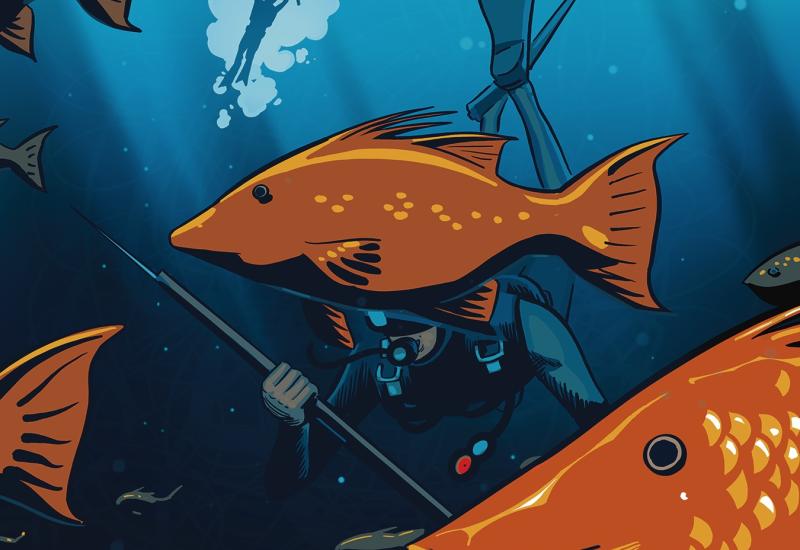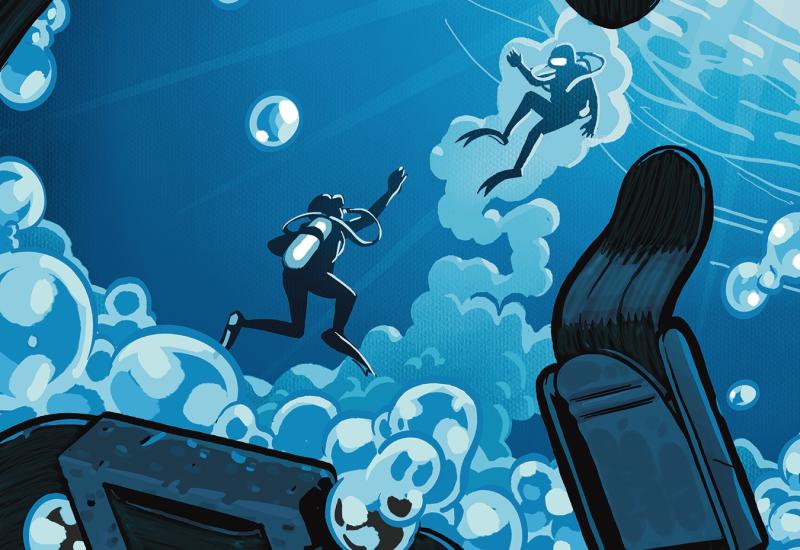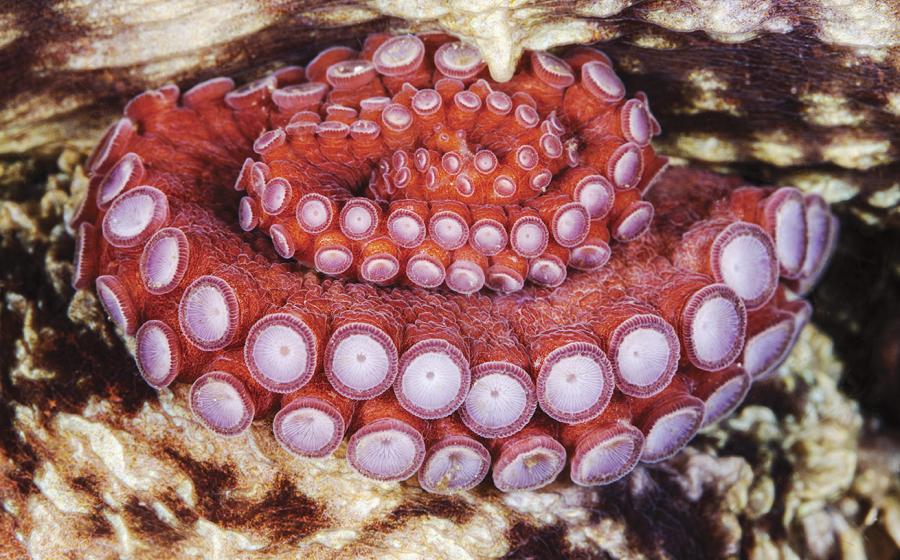A Buddy's Best Effort Fails
July 2000
Setting the Stage
Ed.'s note: The incidents described here are real. Names of locations and people have been changed or deleted.
Joe and Mac went through the same open-water certification course and buddied for all of their post-certification dives. Shortly after, the dive store that offered their diving course and supplied their rental equipment sponsored a boat diving trip, with their instructor serving as divemaster and coordinator.
On the first day of the trip, Joe and Mac dived with their instructor Fred on two wrecks in the 70- to 90-foot range. Both dived in a safe and conscientious manner. For the next dive day, Joe and Mac asked Fred to let them dive on their own, which he willingly agreed to.
The next morning, Mac appeared to be congested and to have an upset stomach; he may have taken some non-prescription medication. The boat ride out to the dive site was smooth, the water clear and calm. Joe and Mac made their own plan to dive the wreck. Fred approved the plan and they were on their way with no sign of stress or difficulty.
The Dive
Joe and Mac descended with ease. At the base of the mooring, around 80 feet, they adjusted their buoyancy and swam the wreck, side by side. After a very short time, Mac stopped suddenly. Joe swam close to check Mac's condition. Mac reached for Joe's octopus, was handed it by Joe, and took two or three deep breaths. Joe then took hold of Mac and started swimming to the mooring line. As he did, the octopus fell from Mac's mouth and Joe replaced it. This happened twice. Joe now realized that Mac was in serious trouble, added air to his own BC and ascended, while holding onto Mac. They ascended quickly, but under control, not pausing for a safety stop. At the surface, Joe raised his hand and yelled. Immediately divers from one of the other dive boats helped pull Mac on board, began giving CPR, and then raced to shore. An ambulance transferred Mac to a hospital where he was pronounced dead from a combination of air embolism and drowning.
Legal Action and Analysis
Mac's family sued the dive store and the instructor. Their claims against the store and instructor included renting defective equipment, providing improper training, keeping poor records, diving beyond 60 feet and failing to provide direct supervision.
During the discovery process and subsequent trial, some of the realities of recreational diving were clarified:
-
Dive equipment rarely causes diving accidents, and, in this case, no defect could be found that related to the actual events.
-
Although Fred was an instructor, he was not teaching at the time of the dives; his original training of these divers had been more than adequate; the divers had successfully made several dives without an instructor after their certification.
-
How well dive rosters and log books are completed does not cause diving accidents.
-
The dive industry's recommendations on such things as depth limits are just that — suggestions, not regulations.
-
Indirect supervision is the most common method used by dive professionals when supervising certified divers. Given this, there is nothing a dive professional can do to directly aid a diver in need.
-
Dive professionals do not have police powers to keep certified divers from diving. In fact, in this case, Joe and Mac were not only certified, but their experience exceeded the dives done in an Advanced Open Water course.
-
Joe's rescue efforts to help Mac were exactly what a dive professional would have done in the same situation.
We will never know what actually happened to Mac, but it was clear some medical condition caused him respiratory distress and did not allow his airway to equalize on the way to the surface. There is nothing a rescuer can do to open another diver's airway while under water. If a diver is not breathing, the best course of action is to get to the surface with all deliberate speed. The dive store was dropped from the case, and the jury found in favor of the defendant instructor.
Lessons for Life
-
Be fit for diving — free from illness and not medicated to cover up an underlying illness.
-
If you should ever throw up under water, do so through your regulator and then clear it or switch to your octopus for a clear airway.
July 2000
Setting the Stage
Ed.'s note: The incidents described here are real. Names of locations and people have been changed or deleted.
Joe and Mac went through the same open-water certification course and buddied for all of their post-certification dives. Shortly after, the dive store that offered their diving course and supplied their rental equipment sponsored a boat diving trip, with their instructor serving as divemaster and coordinator.
On the first day of the trip, Joe and Mac dived with their instructor Fred on two wrecks in the 70- to 90-foot range. Both dived in a safe and conscientious manner. For the next dive day, Joe and Mac asked Fred to let them dive on their own, which he willingly agreed to.
The next morning, Mac appeared to be congested and to have an upset stomach; he may have taken some non-prescription medication. The boat ride out to the dive site was smooth, the water clear and calm. Joe and Mac made their own plan to dive the wreck. Fred approved the plan and they were on their way with no sign of stress or difficulty.
The Dive
Joe and Mac descended with ease. At the base of the mooring, around 80 feet, they adjusted their buoyancy and swam the wreck, side by side. After a very short time, Mac stopped suddenly. Joe swam close to check Mac's condition. Mac reached for Joe's octopus, was handed it by Joe, and took two or three deep breaths. Joe then took hold of Mac and started swimming to the mooring line. As he did, the octopus fell from Mac's mouth and Joe replaced it. This happened twice. Joe now realized that Mac was in serious trouble, added air to his own BC and ascended, while holding onto Mac. They ascended quickly, but under control, not pausing for a safety stop. At the surface, Joe raised his hand and yelled. Immediately divers from one of the other dive boats helped pull Mac on board, began giving CPR, and then raced to shore. An ambulance transferred Mac to a hospital where he was pronounced dead from a combination of air embolism and drowning.
Legal Action and Analysis
Mac's family sued the dive store and the instructor. Their claims against the store and instructor included renting defective equipment, providing improper training, keeping poor records, diving beyond 60 feet and failing to provide direct supervision.
During the discovery process and subsequent trial, some of the realities of recreational diving were clarified:
Dive equipment rarely causes diving accidents, and, in this case, no defect could be found that related to the actual events.
Although Fred was an instructor, he was not teaching at the time of the dives; his original training of these divers had been more than adequate; the divers had successfully made several dives without an instructor after their certification.
How well dive rosters and log books are completed does not cause diving accidents.
The dive industry's recommendations on such things as depth limits are just that — suggestions, not regulations.
Indirect supervision is the most common method used by dive professionals when supervising certified divers. Given this, there is nothing a dive professional can do to directly aid a diver in need.
Dive professionals do not have police powers to keep certified divers from diving. In fact, in this case, Joe and Mac were not only certified, but their experience exceeded the dives done in an Advanced Open Water course.
Joe's rescue efforts to help Mac were exactly what a dive professional would have done in the same situation.
We will never know what actually happened to Mac, but it was clear some medical condition caused him respiratory distress and did not allow his airway to equalize on the way to the surface. There is nothing a rescuer can do to open another diver's airway while under water. If a diver is not breathing, the best course of action is to get to the surface with all deliberate speed. The dive store was dropped from the case, and the jury found in favor of the defendant instructor.
Lessons for Life
Be fit for diving — free from illness and not medicated to cover up an underlying illness.
If you should ever throw up under water, do so through your regulator and then clear it or switch to your octopus for a clear airway.










